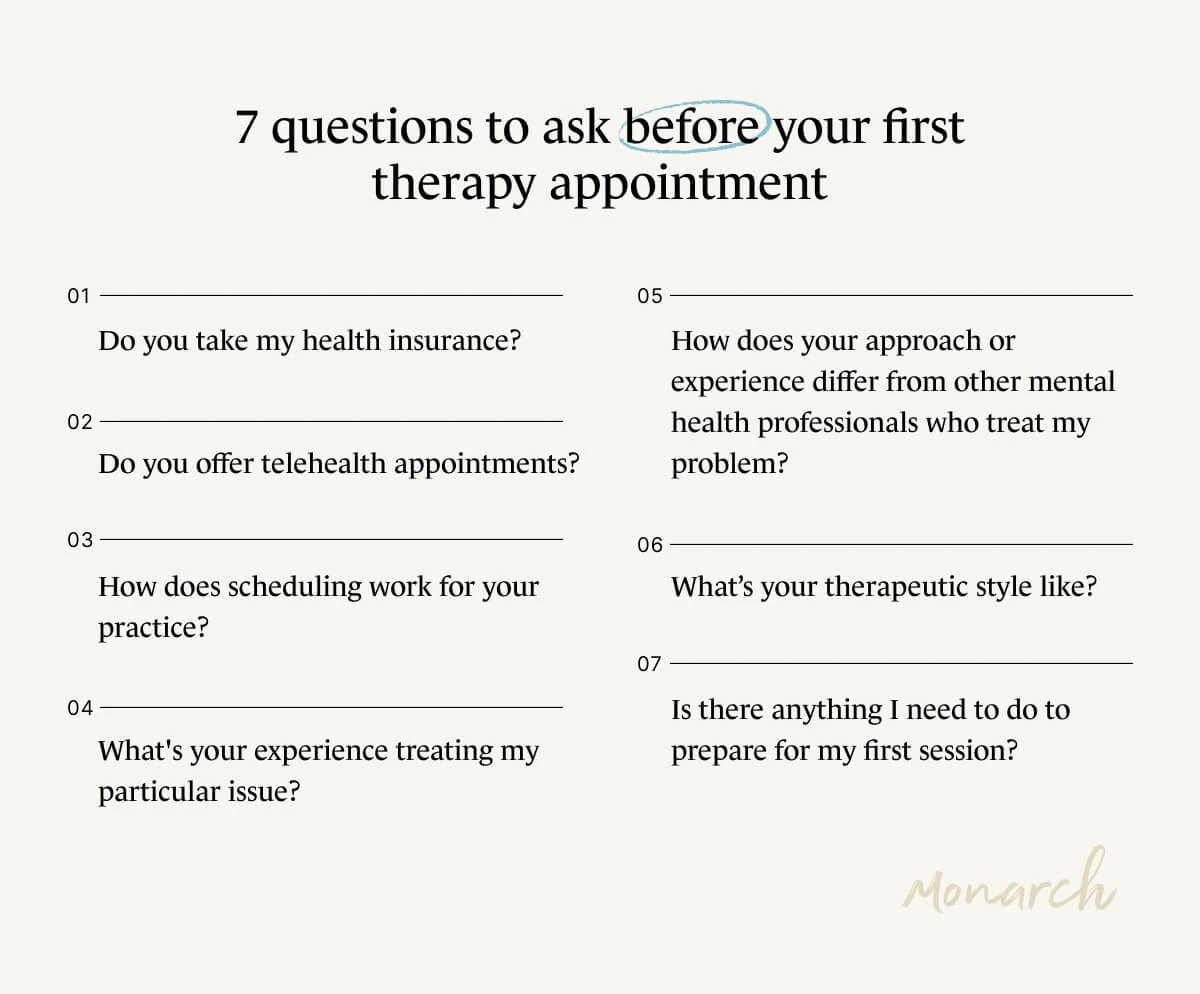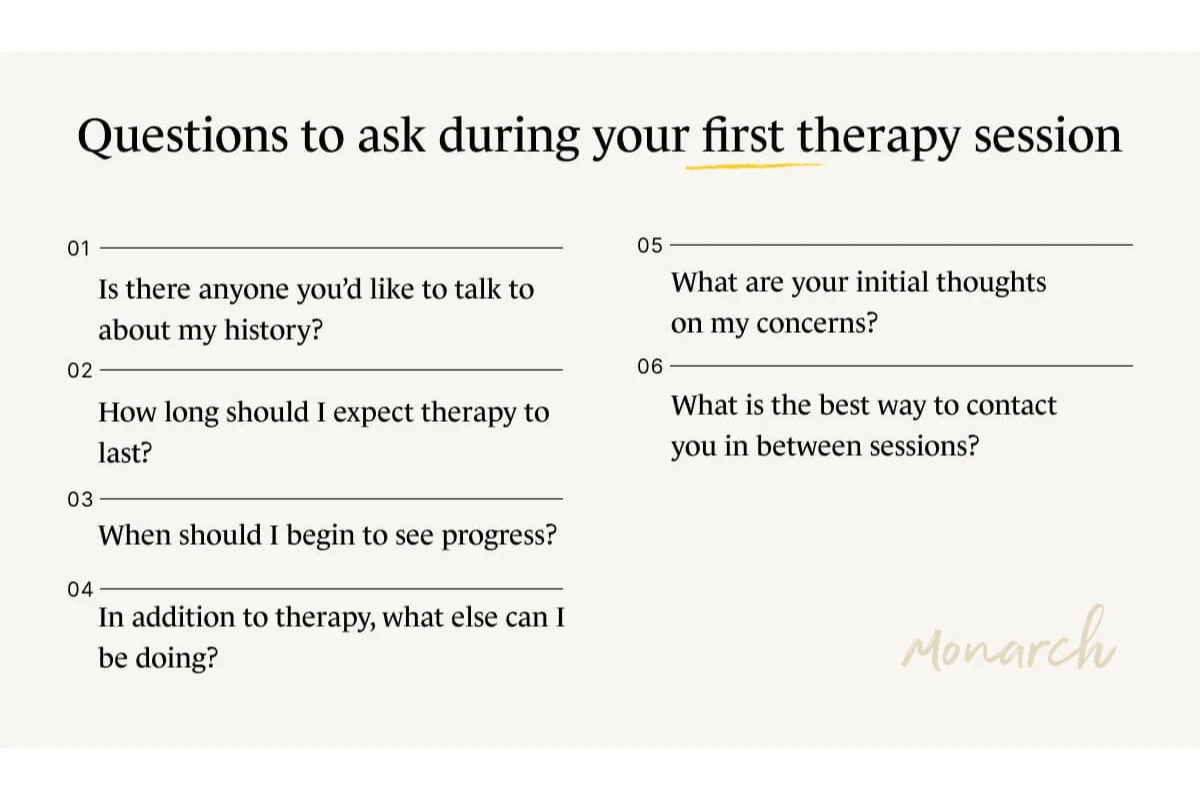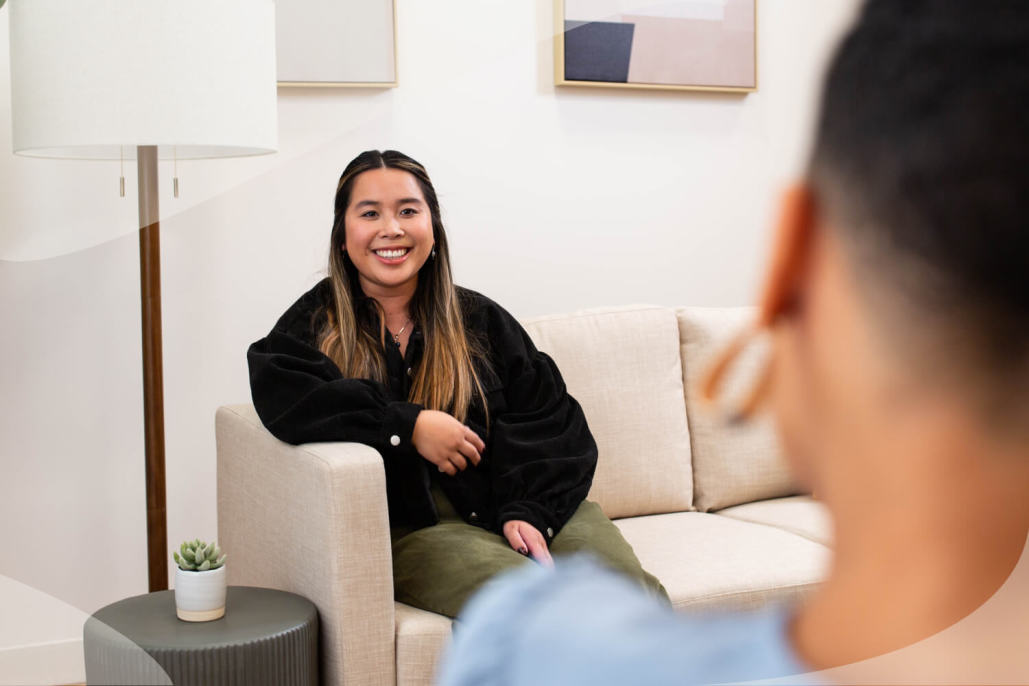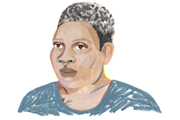Which questions should I ask my new therapist?
What are the best therapist questions?
Searching for a list of good questions to ask a therapist, psychologist, or counselor before and during your first therapy session or free 15-minute initial consultation?
You've arrived in the right place! We see you, and we have a checklist of therapy questions for you below.
What are the best questions to ask a therapist?
Of course, finding a therapist well-suited for your unique needs and goals who is also accepting new clients is step one.
We got you on this too. The Monarch Directory by SimplePractice includes profiles of over 120,000 mental health professionals.
You can view licensed therapists near you and choose to filter them by specialties and types of therapy they practice. Many have online booking and free 15-minute consultations available.
Additionally, you can choose to browse counselors by health insurance provider to find a therapist who accepts your insurance.

Then, once you’ve found some clinicians who look like they might be the right fit for you, what are the best therapy questions to ask them so you can be in-the-know and get all the 411 you need?
7 questions to ask a therapist before your first session
This list of 13 questions for therapists can help you feel more prepared and less anxious when calling for your initial consultation, walking into your 1st therapy session, or logging on for your first telehealth video appointment.
1. Do you take my health insurance?
If you have insurance, finding a therapist who accepts your insurance may be one of the most important things on your mind.
Before deciding to meet with a therapist, it’s important to know how much it will cost you out of pocket. Here's how to find a therapist covered by insurance.
Ask your therapist if they take your insurance, and—if not—whether they offer alternative payment options, like sliding scale fees.
Sometimes therapists may take your insurance, but they may only allot a few spots for insurance clients. On Monarch, you can browse therapists covered by each type of insurance, to find a counselor who accepts your plan.
2. Do you offer telehealth video appointments?
Some therapists only offer online therapy sessions via telehealth, some only offer in-person counseling appointments, and many offer a mix of both.
Determining a therapist’s availability and meeting options, and whether they work for your schedule and comfort level, will help narrow down the search.
Curious whether video therapy works as well as in-person sessions, and what equipment you need for a teletherapy appointment?
Here are the advantages and disadvantages of teletherapy.

3. How does scheduling work for your practice?
Are you able to book appointments with your new therapist online?
How frequently will you be seeing this therapist?
Also, what are their practice policies regarding cancellations and missed appointments?
These are all great questions to ensure that this therapist will fit into your schedule.
4. What's your experience treating my particular issue?
And if you don’t know exactly what’s wrong, that’s OK too.
Describe your concerns to your potential therapist and then ask if they’ve worked with anyone who felt similarly.
If this therapist doesn’t feel like they are the right fit to treat your specific issue, they will often refer you to someone who is.
On Monarch, you can view therapists who treat anxiety, depression, ADHD, trauma, PTSD, and more.
5. How does your therapy approach differ from other mental health professionals who treat my problem?
There are many different types of therapy that get results in treating particular mental health issues.
Here are some of the top styles of therapy and which types of issues they treat.
You can also ask potential which types of therapy they prefer.
While all therapists abide by the same code of ethics, each mental health professional has their own approach to therapy.

6. What’s your therapeutic style like?
Different therapists also have different styles of session engagement.
Licensed marriage and family therapist Dr. Ben Caldwell, Psy.D., suggests asking if they listen or talk more during a session, or if they assign homework between sessions.
“This is also a good opportunity to voice your own preferences—that can be important to you and the therapist alike in determining whether you’re a good fit,” says Dr. Caldwell.
7. Is there anything I need to do to prepare for my first session?
If you’ve decided to move forward and book an appointment with this therapist, they may have some tasks for you to complete before your first session.
Whether it’s filling out medical forms, gathering information on your family’s medical history, or simply taking some deep breaths before the appointment starts, your therapist will likely have a few tips to ensure your first session goes as smoothly as possible.
Here are some items you may want to bring to your first therapy session.
6 questions to ask a therapist during your first session
At your first therapy appointment or initial 15-minute free consultation, there are several more therapy questions to ask.
1. Is there anyone you’d like to talk to about my history?
Sometimes, therapists will want to talk with people in your life to get more information.
Talking with your doctor, family, or friends can provide a therapist with more context.
It’s OK if you don’t want them to, and they will never talk to anyone without your permission.
2. How long will I be in therapy?
Your therapist should be able to give you a general idea of how long treatment should last.
Remember, this is just a guideline based on what the therapist knows so far, and is by no means set in stone.
Dr. Caldwell notes that you should ask this question “with the understanding that it can be impacted by a lot of things along the way, and that you need to hold up your end of the bargain.”

3. When will I begin to see progress?
Therapy isn’t a quick fix, which can be discouraging.
Asking your therapist for an estimated timeline of progress, or what progress will look like, can help maintain motivation.
Like a treatment plan, a progress timeline is fluid because it depends on a lot of different factors. Having a general expectation of progress helps when determining whether this therapist or type of therapy is working.
4. In addition to therapy, what else can I be doing?
Therapy is a major step in improving your mental health, but attending appointments with a therapist is not the only step.
Some therapists assign homework between sessions as part of your treatment plan, and others will suggest trying things like journaling, mindfulness techniques, or exercise to help improve your mental health outside of your appointment.
5. What're your initial thoughts on my concerns?
Towards the end of the session, Dr. Caldwell suggests asking: “Based on what I’ve told you so far, what do you think? Do you have any ideas about why this might be happening?”
Getting your therapist’s initial thoughts ensures your therapist understands what you’ve told them, and it can be comforting to know that someone has ideas of how to help after only one session.
6. What's the best way to contact you in between sessions?
Different mental health professionals have different philosophies about contact with clients between sessions.
Some therapists only allow you to contact them in case of emergency, whereas others have a client portal you can use during business hours. Some counselors will text with their clients whenever.
There are no right or wrong questions to ask your therapist, though they may not be able to answer some of your more personal ones about themselves.
It’s important to leave your meeting with a clear understanding of the communication boundaries.
There are no right or wrong questions to ask your therapist, though they may not be able to answer some of your more personal ones about themselves.
Your therapist wants you to feel as comfortable as possible, and you should ask them anything you want to know to feel more relaxed.
Asking questions to find the right therapist and remain fully informed throughout your therapy journey is an important part of improving your mental health.
Find a therapist or counselor near you
The Monarch Directory by SimplePractice can help you to find a therapist aligned with your specific needs and goals.
Many have online booking and offer free 15-minute initial consultations, as well as telehealth video options.

Finally, you can also choose to browse therapists by insurance to find a provider who accepts your insurance.
READ NEXT: What Happens if I Run Into My Therapist in Public?
Need to find a therapist near you? Check out the Monarch Directory by SimplePractice to find mental health practitioners with availability and online booking.







